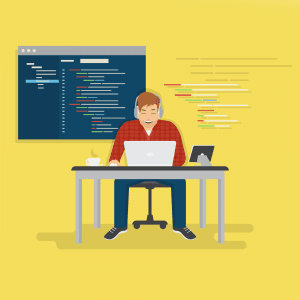10 Critical Tips to Learn Programming Faster
If you have taken a call to grow your career in the information technology sector, knowledge of coding is essential. It is the most in-demand skill in the industry. Thus, the programming knowledge you gain and practice, in the beginning, is priceless.
Learning the art of programming can be a bit of a struggle for some. However, knowing some ways for making your learning process faster can be a huge help for you. It can be a manageable task if you follow and implement a few simple steps.
Let’s take a look at 10 quick and easy tips that will help you learn programming skills.

1. Start With the Basics and Spend More Time There
A mistake many students commit in any learning process is to try and skip the basics or spend less time with the fundamentals of a subject, and instead jump to chapter 3 or 4 right away—ignoring or skimming over the first few chapters.
While this may work in some areas of knowledge, while learning computer programming, you must make it a point to spend more time fully grasping the fundamentals of coding. If you are learning through a tutor and you find that they are going too quickly for you to follow, you must tell them to go slowly and explain all points so that your understanding is firm and clear.
More often than not, people get stuck when they reach higher levels and may find themselves getting lost easily and having to go back to learn basic material. Learning the basics well means your overall time required to finish learning programming can be cut down.
Coding education sites such as freeCodeCamp and Codecademy offer several 101-style courses you can start with.
2. Coding by Hand Is Highly Recommended
This might sound strange to some. Why use your hands to write code when the actual work is expected to be done on a computer? There are strong reasons for it.
One reason that can be immediately understood is that if you were to get called for an interview for a programming job, the technical evaluation process would include coding by hand. While that is a valid reason, experts have found that if the coding is learned this way in the beginning, the next levels of learning are easier and faster. It’s because coding by hand is the most efficient method of learning how to program. Therefore, the sooner you adopt the basics at the beginning, the better.
3. Fiddle Around With the Codes
This basically means you need not be stuck in a straight jacket of coding exactly as per the inputs are given. You must try your hand at making changes in it just for the heck of it. That way, you may learn how the end results get altered when you make changes to the coding.
This does not mean you go about changing the whole program; far from it. When you reach the stage of being capable of changing whole code programs in the learning process, you may be given an assignment to write the codes for a certain program. You will know the final output that is expected from your code. After doing it right, go back and tinker with it a bit here and there, and see how the output changes.
This will give you enormous confidence in your skills and you will know how you can make these changes if the desired output is not achieved in any future assignment.
4. Reach Out to Others for Guidance
Seeking help from professionals while learning a new skill is never looked down upon. As with many professions, a fellow programmer will likely not feel any hitch in sharing their knowledge with you. In most cases, they have been in the same position as you find yourself to be in now, and help will be forthcoming.
You may need help with understanding where the bug in your program is or when getting stuck in a debugging effort. Like solving a Sudoku game or a crossword puzzle, the other person’s glance might go straight to the point, which might have escaped your attention all day long. Your co-programmers can be included in this exercise too. Don’t feel shy that they will make fun of you. They may be stuck with a similar issue one day and will feel comfortable coming to you for help.
5. Take Breaks to Get Refreshed
You’ve probably come across friends in the same profession burning the midnight oil, yet not arriving at the solution to a bug detected and reported by a client or testing team.

These are commonplace occurrences in the industry. But you might have heard of instances where the coder takes a break, plays a game, or even takes a nap, and then, back at the monitor, the solution pops up like a flash. Taking advantage of the benefits of taking breaks will make you better at learning programming.
6.Use Online Resources
This, again, is not rocket science. When learning any subject in a traditional classroom, we sometimes stumble upon difficulties grasping the materials teachers teach us. And that’s when we seek other resources to get a better understanding of the subjects.
Learning programming in a classroom environment or through an online tutorial is no different in this matter. Browse online resources and programming guides, and use search engines to gather insights to help you understand the subject clearly. You should have the time and the patience to dig out the information needed.
7. Read Relevant Material
This could be an extension of the last tip, but in a different context. In this tip, the advice to read extensively is not just about the coding process alone. The idea is to boost your domain knowledge while doing coding work.
In a majority of real-life situations, if you are engaged in writing code for a particular client, the client’s team will possess complete knowledge of their business, how it works, and everything else there is to know about it, but they would not know how to write the code for a program to improve that process.
You may be an expert at coding, but your knowledge of the business you’re dealing with may be very limited. That’s why equipping yourself with information about a particular business is crucial. It will be much easier for you to program and deliver what’s expected of you.
8. Learn From the Bugs
Life is an endless learning process. The previous generations had the luxury of making mistakes, learning from them, and then finding success. In today’s context, you have to be more alert and learn from others’ mistakes, and not commit the same errors yourself.
Bugs appearing in a program you wrote are part of a fully acceptable and commonly occurring situation. Your programming skills lie in quickly detecting the bug and resolving it. In many cases, detecting the bug may take a while, but once found, it may take very little time to resolve or reset the codes.
There are debuggers available that you can use to make the resolution process faster. The effort may have to be repeated a few times, since you will have to get back to the full program to test out the changes made in the coding and check if the expected output is being achieved or not.
9. Never Get Tired of Practicing
The adage “practice makes perfect” holds true no matter what profession you are in. In the case of coding or programming, it becomes even more critical, since your first exposure is through books or other theoretical methods whereas the real work has to be done hands-on. You must, therefore, spend as much time on a computer as you can to get the hang of it in the initial stages.
Take any model project and start doing it. Some experts suggest personal projects as an effective starting point. Think up a project and start writing the codes. You may feel like you’re getting nowhere, but slowly, the solution will emerge.
The more you practice your coding during your learning days, the sooner you will end up feeling confident to take on any coding assignment. That kind of confidence will help you perform quite admirably in a technical evaluation by your prospective employers. If you are lucky, you might start off with a tough assignment that could even fast-track your career.
10. Keep Your Cool
Coding can be exciting, yet exhausting. People are known to spend many hours at a stretch trying to find a solution or debug the errors. Your complete schedule of meals and sleep could be affected. That’s not a very healthy situation to be in, particularly when you are young. You need to balance this by keeping yourself physically and mentally alert.

Our brains need to cool off from time to time. It helps to moderate your levels of stress, which ultimately helps you be more focused on learning and excel in your performance.
One way is to remain calm through the rough days. There may be situations in a full-time programming assignment when your boss might blow their top because a project is not getting completed on time. You must prepare right from your learning days to remain calm even in the midst of adversity. This will help you not just with your programming career, but also in your personal life.
There are many ways you can achieve this calm state of mind. Some would suggest mindfulness exercises such as meditation or yoga. Others say to take your mind off it for a while. Just moving out to the balcony to take in some fresh, cool air and watch the traffic moving on the road below could bring a sense of calm. Maybe you are fond of gaming on your phone. If that’s the case, play for a few minutes to refresh your mental faculty.
Simple Steps Can Increase Your Programming Knowledge
Programming is a creative job, though your creative abilities may remain hidden from public view. Only people with a knowledge of coding and software programming will know the value of the work you are putting in.
You must be prepared to sacrifice a major portion of your workday to sit in front of a computer. Some of your friends in other professions might be off having fun, but you may not be able to join them until you finish your work, which has no time limitations while the solutions keep eluding you on the screen.
Lastly, keep your quest for knowledge alive and going all the time. A general perception is that programmers are geeks with hardly any interest outside of their coding work and can bond only with their own tribe. You can break out of such stereotypes and develop a number of other hobbies by adding to your knowledge base. You’ll be good not only at learning programming but also at learning about the world you live in. It will make you a well-informed and well-rounded person for sure.
Published on Java Code Geeks with permission by John Sonmez, partner at our JCG program. See the original article here: 10 Critical Tips to Learn Programming Faster Opinions expressed by Java Code Geeks contributors are their own. |




